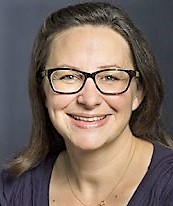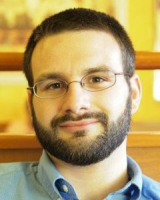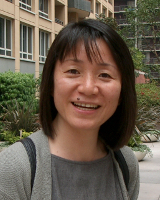Takeshi Watanabe
 Takeshi Watanabe is Assistant Professor of East Asian Studies at Wesleyan University. He is currently completing a book manuscript, Healing through Writing: Eiga monogatari, A Women’s History of Late Heian Japan. The book examines A Tale of Flowering Fortunes, a historical tale contemporaneous to The Tale of Genji (c. 1000). It shows how the rise of writing in the vernacular allowed for a new type of history, one that sought to capture court gossip and channel its divisive energy into stories that brought healing. The book aims to inspire conversations about what constitutes historical writing and its aims.
Takeshi Watanabe is Assistant Professor of East Asian Studies at Wesleyan University. He is currently completing a book manuscript, Healing through Writing: Eiga monogatari, A Women’s History of Late Heian Japan. The book examines A Tale of Flowering Fortunes, a historical tale contemporaneous to The Tale of Genji (c. 1000). It shows how the rise of writing in the vernacular allowed for a new type of history, one that sought to capture court gossip and channel its divisive energy into stories that brought healing. The book aims to inspire conversations about what constitutes historical writing and its aims.
Watanabe’s next project centers on representations of food and eating in premodern Japan. He has two forthcoming publications on food in the Heian period, one in a forthcoming collection of papers on Japanese foodways edited by Nancy Stalker, Devouring Japan: Global Perspectives on Japanese Culinary Identity (Oxford University Press). He has also published in Japanese and English on The Illustrated Scroll of the Wine or Rice Debate (Shuhanron emaki, 16th century). https://nirc.nanzan-u.ac.jp/nfile/2989 He has also published on Japanese tea culture. Watanabe’s interest in food seeks to challenge assumptions about Japanese identity, and to foster engagement with food as a vehicle through which society and individuals express their dilemmas and aspirations.
He has also just completed a chapter for a new Japanese edition of Yamai no soshi, edited by Kasuya Makoto and Yamamoto Satomi, and published by Chuo Koron bijutsusha, coming out in April. This essay in English summarizes and offers commentary on the Japanese scholarship.
Kendra Strand
 Kendra Strand is assistant professor of Japanese at the University of Iowa. She specializes in premodern Japanese literature and visual culture, with expertise in travel writing, poetry, calligraphy, and landscape painting. Her research is founded in examining the historical contexts in which works of literature and art were created.
Kendra Strand is assistant professor of Japanese at the University of Iowa. She specializes in premodern Japanese literature and visual culture, with expertise in travel writing, poetry, calligraphy, and landscape painting. Her research is founded in examining the historical contexts in which works of literature and art were created.
Strand has translated four medieval travel diaries by political elites of the fourteenth century for publication and for her dissertation, Aesthetics of Space: Representations of Travel in Medieval Japan. In her book manuscript, she investigates the acts of traveling to famous places, describing the landscape, and composing poetry as a part of the ongoing effort for social-political success by warrior elites of fourteenth-century Japan. In travel journals of this time, the journey is an act that constitutes the landscape, and composing poetry is a means of redefining history. Understanding how humans approach and interact with important places, as well as the ways in which the symbolic power of geographical sites are developed at different points in history, will also help to illuminate the relationships between human cultures and the landscapes they create.
Strand’s research interests extend to issues of canon and interpretation in literature and art, as well as the ways in which historical themes surface in contemporary popular culture. She is also interested in material culture, particularly aesthetic issues of calligraphy and paper decoration, as well as the history of books, publication practices, the circulation of texts in medieval and early modern Japan.
Christopher J. Lowy
 Christopher Lowy is a Ph.D. candidate in Japanese Literature at the University of Washington. His dissertation examines the relationship between script and literature in contemporary Japanese literature. He has published in literary magazines such as Eureka, and his translations regularly appear in the Genron journal of criticism. He was awarded a Japan Foundation Doctoral Fellowship, 2016–2017.
Christopher Lowy is a Ph.D. candidate in Japanese Literature at the University of Washington. His dissertation examines the relationship between script and literature in contemporary Japanese literature. He has published in literary magazines such as Eureka, and his translations regularly appear in the Genron journal of criticism. He was awarded a Japan Foundation Doctoral Fellowship, 2016–2017.
J. Keith Vincent
 J. Keith Vincent is Chair of the Department of World Languages & Literatures and Associate Professor of Japanese & Comparative Literature and Women’s, Gender and Sexuality Studies at Boston University.
J. Keith Vincent is Chair of the Department of World Languages & Literatures and Associate Professor of Japanese & Comparative Literature and Women’s, Gender and Sexuality Studies at Boston University.
His research focuses on modern Japanese literature, queer theory, translation, and the novel. He is the author of Two-Timing Modernity: Homosocial Narrative in Modern Japanese Fiction (Harvard Asia Center, 2012). Recent articles include “Queer Reading and Japanese Literature,” in the Routledge Handbook of Modern Japanese Literature (2016) and “Sex on the Mind: Queer Theory Meets Cognitive Theory,” in the Oxford Handbook of Cognitive Literary Studies (2015). Recent edited volumes include Sōseki Great and Small (Tai-shō no Sōseki), a “mini” special issue of the Japanese journal Bungaku (Nov-Dec, 2014), co-edited with Alan Tansman, and Honoring Eve, a Spring 2010 issue of Criticism co-edited with Erin Murphy, on the work of queer theorist Eve Kosofsky Sedgwick. His translation of Okamoto Kanoko’s A Riot of Goldfish (Hesperus Press, 2010) won the 2011 U.S. Japan Friendship Commission Prize for the Translation of Japanese Literature, and his translation of Tanizaki Jun’ichirō’s novella Devils in Daylight is forthcoming from New Directions. He is currently working on two edited volumes on Sōseki, in Japanese and English, and a book on haiku and the Japanese novel, with a focus on Masaoka Shiki and Natsume Sōseki.
Stephen Miller
 Stephen D. Miller is associate professor of Japanese language and literature at the University of Massachusetts Amherst. Miller is author of The Wind from Vulture Peak: The Buddhification of Japanese Waka in the Heian Period (Cornell East Asia Series, 2013). He is translator of A Pilgrim’s Guide to Forty-Six Temples (Weatherhill Inc., 1990), and editor of Partings at Dawn: An Anthology of Japanese Gay Literature (Gay Sunshine Press, 1996). Miller lived in Japan for nine years between 1980 and 1999, in part as the recipient of two Japan Foundation fellowships for research abroad. Miller, with poet Patrick Donnelly, is co-translator of the classical Japanese Buddhist poems in The Wind from Vulture Peak: The Buddhification of Japanese Waka in the Heian Period (Cornell East Asia Series, 2013), which were awarded the 2015-2016 Japan-U.S. Friendship Commission Prize for the Translation of Japanese Literature, from the Donald Keene Center of Japanese Culture at Columbia University. Miller and Donnelly’s translations have appeared in Bateau, Cha: An Asian Literary Journal, Circumference, The Cortland Review, The Drunken Boat, eXchanges, Inquiring Mind, Kyoto Journal, Mead, Metamorphoses, The New Haven Review, New Plains Review, NOON: The Journal of the Short Poem, Poetry International, Zone 3, and their translation of the 16th century Japanese Nō play Shunzei Tadanori appeared in Like Clouds or Mists: Studies and Translations of Nō Plays of the Genpei War (Cornell East Asia Series, 2014).
Stephen D. Miller is associate professor of Japanese language and literature at the University of Massachusetts Amherst. Miller is author of The Wind from Vulture Peak: The Buddhification of Japanese Waka in the Heian Period (Cornell East Asia Series, 2013). He is translator of A Pilgrim’s Guide to Forty-Six Temples (Weatherhill Inc., 1990), and editor of Partings at Dawn: An Anthology of Japanese Gay Literature (Gay Sunshine Press, 1996). Miller lived in Japan for nine years between 1980 and 1999, in part as the recipient of two Japan Foundation fellowships for research abroad. Miller, with poet Patrick Donnelly, is co-translator of the classical Japanese Buddhist poems in The Wind from Vulture Peak: The Buddhification of Japanese Waka in the Heian Period (Cornell East Asia Series, 2013), which were awarded the 2015-2016 Japan-U.S. Friendship Commission Prize for the Translation of Japanese Literature, from the Donald Keene Center of Japanese Culture at Columbia University. Miller and Donnelly’s translations have appeared in Bateau, Cha: An Asian Literary Journal, Circumference, The Cortland Review, The Drunken Boat, eXchanges, Inquiring Mind, Kyoto Journal, Mead, Metamorphoses, The New Haven Review, New Plains Review, NOON: The Journal of the Short Poem, Poetry International, Zone 3, and their translation of the 16th century Japanese Nō play Shunzei Tadanori appeared in Like Clouds or Mists: Studies and Translations of Nō Plays of the Genpei War (Cornell East Asia Series, 2014).
Patrick Donnelly
 Patrick Donnelly is the author of three books of poetry, The Charge (Ausable Press, 2003, since 2009 part of Copper Canyon Press), Nocturnes of the Brothel of Ruin (Four Way Books, 2012), a 2013 finalist for the Lambda Literary Award, and Little-Known Operas, forthcoming from Four Way Books in 2019. Donnelly is director of the Poetry Seminar at The Frost Place, Robert Frost’s old homestead in Franconia, NH, now a center for poetry and the arts. He is also a current associate editor of Poetry International, and teaches at Smith College. His poetry has appeared or is forthcoming in many journals, including The Kenyon Review Online, American Poetry Review, Ploughshares, The Yale Review,and The Virginia Quarterly Review. With Stephen D. Miller, Donnelly translates classical Japanese poetry and drama. Donnelly and Miller’s translations in The Wind from Vulture Peak: The Buddhification of Japanese Waka in the Heian Period (Cornell East Asia Series, 2013), were awarded the 2015-2016 Japan-U.S. Friendship Commission Prize for the Translation of Japanese Literature. Donnelly’s other awards include a U.S./Japan Creative Artists Program Award, an Artist Fellowship from the Massachusetts Cultural Council, the Margaret Bridgman Fellowship in Poetry from the Bread Loaf Writers’ Conference, and a 2018 Amy Clampitt Residency Award.
Patrick Donnelly is the author of three books of poetry, The Charge (Ausable Press, 2003, since 2009 part of Copper Canyon Press), Nocturnes of the Brothel of Ruin (Four Way Books, 2012), a 2013 finalist for the Lambda Literary Award, and Little-Known Operas, forthcoming from Four Way Books in 2019. Donnelly is director of the Poetry Seminar at The Frost Place, Robert Frost’s old homestead in Franconia, NH, now a center for poetry and the arts. He is also a current associate editor of Poetry International, and teaches at Smith College. His poetry has appeared or is forthcoming in many journals, including The Kenyon Review Online, American Poetry Review, Ploughshares, The Yale Review,and The Virginia Quarterly Review. With Stephen D. Miller, Donnelly translates classical Japanese poetry and drama. Donnelly and Miller’s translations in The Wind from Vulture Peak: The Buddhification of Japanese Waka in the Heian Period (Cornell East Asia Series, 2013), were awarded the 2015-2016 Japan-U.S. Friendship Commission Prize for the Translation of Japanese Literature. Donnelly’s other awards include a U.S./Japan Creative Artists Program Award, an Artist Fellowship from the Massachusetts Cultural Council, the Margaret Bridgman Fellowship in Poetry from the Bread Loaf Writers’ Conference, and a 2018 Amy Clampitt Residency Award.
Samuel Perry
 Samuel Perry is Associate Professor of East Asian Studies at Brown University.
Samuel Perry is Associate Professor of East Asian Studies at Brown University.
“With a PhD from the University of Chicago and a postdoctoral fellowship at Harvard University, I have spent many years in Japan and South Korea doing research, most recently in Tokyo, where I surveyed various archives for my next monograph “From Across the Genkai Sea: Japanese Culture and the Korean War.” I have also been involved recently in two translation projects: Five Faces of Japanese Feminism: Crimson and Other Works (Univ. Hawaii Press, 2016) is a collection of translated stories by Sata Ineko, funded with a grant from the National Endowment for the Arts; “The Melancholy of Queer Korea: A Century of Forgotten Fiction” will be the first anthology of homoerotic writings from Korea to be published in English.
Eve Zimmerman

Eve Zimmerman is associate professor of Japanese at Wellesley College
.I am writing a book on how the fluid category of “girlhood” is used by female writers and manga artists in postwar Japan to express views on gender, sexuality, and history. My first book, a study of Nakagami Kenji, was a literary “ethnography” of a key Japanese writer from the burakumin (outcaste) class. What unites my two projects is my sense that what seems to be peripheral to Japanese culture often turns out to be symbolically central. In a past life (before Wellesley), I did translation, publishing a collection of Nakagami’s short stories and the autobiography of a Japanese strawberry farmer in California.
My favorite new classes are a course on the Japanese supernatural, which explores how old myths and strange beings shaped the formation of modern consciousness, and a course on coming-of-age narratives from around the globe (comparative literature). I also enjoy teaching fourth-year Japanese, popular culture, postwar Japanese fiction and, especially, Japanese film. I’ve supervised some excellent theses and independent projects in my time at Wellesley: Godzilla, Kurosawa meets the American western, Mech anime, early Mishima, Sumii Sue and the buraku, Yamada Amy, Takarazuka, and Murakami Haruki, among others.
Within Wellesley, I support the Associated Kyoto Program and serve as its campus representative. I’ve also helped organize events on the Wellesley campus, such as Common Text (Godzilla), and I have most enjoyed working with colleagues in inter-departmental initiatives such as the Newhouse Center, the Comparative Literature program, the Albright Institute, and Cinema and Media Studies.
Outside Wellesley, I am co-editing an international volume (Japan, Europe, the U.S.) entitled Theorizing Japanese Literature: Memories, Evocations, Ghosts. I currently serve as an elected representative to the Association for Asian Studies and I’ve been an associate in research at the Reischauer Institute for the past decade.
Sarah Frederick
 Sarah Frederick is Associate Professor of Japanese and Comparative Literature at Boston University. Her areas of specialization are in 20th-century Japanese literature and history and relationships among mass media, modern literature, gender, and culture. She has worked extensively on 1920s and 30s women’s print culture, image and text in literature of the 1930s-1950s, and gender and sexuality in modern literature and culture. She teaches courses in all periods of Japanese literature, film, and popular culture, as well as comparative courses on topics such as melodrama as a genre in fiction and cinema. She has received fellowships from the NEH, Fulbright-Hays, Javits, Hakuho Foundation, and Japanese Ministry of Education for her research.
Sarah Frederick is Associate Professor of Japanese and Comparative Literature at Boston University. Her areas of specialization are in 20th-century Japanese literature and history and relationships among mass media, modern literature, gender, and culture. She has worked extensively on 1920s and 30s women’s print culture, image and text in literature of the 1930s-1950s, and gender and sexuality in modern literature and culture. She teaches courses in all periods of Japanese literature, film, and popular culture, as well as comparative courses on topics such as melodrama as a genre in fiction and cinema. She has received fellowships from the NEH, Fulbright-Hays, Javits, Hakuho Foundation, and Japanese Ministry of Education for her research.
Frederick is the author of Turning Pages: Reading and Writing Women’s Magazines in Interwar Japan (University of Hawaii Press, 2006), and articles in positions: East Asian Cultures Critique, US Japan Women’s Journal and Japan Forum. She was also a contributor to Bad Girls of Japan, Laura Miller and Jan Bardsley, eds.
Frederick is currently working on a book project that looks at 20th-century Japanese literature and history through the voluminous works of Yoshiya Nobuko (1896-1973), one of modern Japan’s most commercially successful authors who is also seen as formative of many aspects of girls’ culture (shōjo culture). The project deals with materials from throughout Yoshiya’s writing life, from the 1910s to the 1970s, including her travel writings in Asia during and after the Pacific war, as well as her afterlife in popular girls’ culture, including manga and anime.
In addition to the book on Yoshiya Nobuko, Professor Frederick is also currently working on a joint Digital Humanities project with Alice Tseng (BU, History of Art and Architecture) “Mapping Kyoto” funded in part by the Hariri Institute for Computational Research and a related paper mapping Soseki’s travels in Kyoto. She is also translating Soseki’s essay about traveling to Kyoto.
Ikumi Kaminishi
 Ikumi Kaminishi is an associate professor of art history at Tufts University. She specializes in East Asian cultures and Japanese painting. She is the author of Explaining Pictures: Buddhist Propaganda and ETOKI Storytelling in Japan. Currently she is writing a book on Japan’s pre-modern visual culture with particular interests in political intrigues behind illustrated hand-scrolls (emakimono), including the Kitano Tenjin scrolls. Her articles on the medieval picture scrolls of Kegon-shū soshi eden (Legends of the Kegon Buddhist school founders) and the Kusōzu (Decaying corpse in nine Stages) focused on the issues of Buddhism and women. She received her Ph. D. from the University of Chicago.
Ikumi Kaminishi is an associate professor of art history at Tufts University. She specializes in East Asian cultures and Japanese painting. She is the author of Explaining Pictures: Buddhist Propaganda and ETOKI Storytelling in Japan. Currently she is writing a book on Japan’s pre-modern visual culture with particular interests in political intrigues behind illustrated hand-scrolls (emakimono), including the Kitano Tenjin scrolls. Her articles on the medieval picture scrolls of Kegon-shū soshi eden (Legends of the Kegon Buddhist school founders) and the Kusōzu (Decaying corpse in nine Stages) focused on the issues of Buddhism and women. She received her Ph. D. from the University of Chicago.
Allen Hockley
 Allen Hockley is associate professor of art history and his research engages two fields of study: early Japanese photography and woodblock prints and illustrated books from the Tokugawa through early Showa periods. He teaches a broad array of courses on Japanese and Asian art including: Sacred Art and Architecture of Japan, The Japanese Painting Tradition, Japanese Architecture, Japanese Prints, Contemporary Art of Asia, Sacred Architecture of Asia, and Chinese Art. He offers advanced seminars on Colonial-era Photography in Africa, the Middle East and Asia.
Allen Hockley is associate professor of art history and his research engages two fields of study: early Japanese photography and woodblock prints and illustrated books from the Tokugawa through early Showa periods. He teaches a broad array of courses on Japanese and Asian art including: Sacred Art and Architecture of Japan, The Japanese Painting Tradition, Japanese Architecture, Japanese Prints, Contemporary Art of Asia, Sacred Architecture of Asia, and Chinese Art. He offers advanced seminars on Colonial-era Photography in Africa, the Middle East and Asia.
David Boyd
David Boyd is a Ph.D. candidate in East Asian
Studies at Princeton University, where  his research focuses on literary celebrity in early twentieth-century Japan. David is also co-editor of Inventory, a translation journal from Princeton University. He has translated stories by EnJoe Toh, Oyamada Hiroko and Uchida Hyakken, among others. His translation of Slow Boat, a novel by Furukawa Hideo, won the Japan-U.S. Friendship Commission Prize for the Translation of Japanese Literature in 2018.
his research focuses on literary celebrity in early twentieth-century Japan. David is also co-editor of Inventory, a translation journal from Princeton University. He has translated stories by EnJoe Toh, Oyamada Hiroko and Uchida Hyakken, among others. His translation of Slow Boat, a novel by Furukawa Hideo, won the Japan-U.S. Friendship Commission Prize for the Translation of Japanese Literature in 2018.

